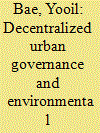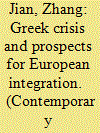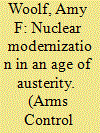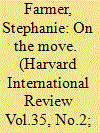|
|
|
Sort Order |
|
|
|
Items / Page
|
|
|
|
|
|
|
| Srl | Item |
| 1 |
ID:
128524


|
|
|
|
|
| Publication |
2013.
|
| Summary/Abstract |
This paper explores how decentralization has created a "local political arena" and has been transforming governance in the environmental management sector in South Korea. Korea has been known as a developmental state where the strong central government and businesses have conspicuously dominated during most of its industrialization period. Yet, the deepened democracy, global competitiveness and fiscal austerity have pressured central political stakeholders to devolve highly centralized functions and authority to local bodies since the mid-1990s. The building of democratic institutions at the local level, including directly elected mayors and city councils, has created room for local politics and diminished central political leverage over local affairs. The national economic crisis has highlighted the inefficiency of the centralized system and encouraged further administrative and fiscal decentralization under the democratic governments. In this issue image_86_4_Baecontext, while the central government and big businesses continue to have a significant say in policy making, local executives, with their expanded decisional authority and resources, are trying to improve the images of their cities and to take responsibility for promoting urban economies and improving quality of life in the age of trans-border links and competition. This paper analyzes the case of Ulsan, where Hyundai and several other conglomerates are located and which has been a symbol of state-led industrialization during most of the development period. Despite the large role played by the centre in the development of Ulsan, the empowered mayor of the city has successfully turned citizens' attention to post-industrial aspects of governance for ensuring the future competitiveness of the city in global markets by orchestrating collaborative implementation of environmental policies. The paper explores how this governance shift in Ulsan has led successful collaborative environmental change by mobilizing local businesses, civic organizations and general citizens who might not have been interested in the making of an "environment-friendly city
|
|
|
|
|
|
|
|
|
|
|
|
|
|
|
|
| 2 |
ID:
142815


|
|
|
| 3 |
ID:
129107


|
|
|
|
|
| Publication |
2014.
|
| Summary/Abstract |
When Secretary of Defense Chuck Hagel spoke about U.S. nuclear forces at F.E. Warren Air Force Base in early January, he emphasized two key points. First, he declared that the United States was "going to invest in the modernization we need to invest in to keep that deterrent stronger than it's ever been." He then added that "we're going to continue to require every element of our nuclear deterrent in the triad."[1] His audience at the Wyoming base might have heard a welcome, if unexceptional, commitment to the future of the U.S. nuclear deterrent, but there could have been more to the secretary's comments. In this period of fiscal constraints and declining defense budgets, many in in the wider policy community are voicing doubts about the ability of the United not only to maintain all three legs of the nuclear triad, but also to replace each leg with new missiles, bombers, and submarines. Although the current debate over the future composition of the U.S. nuclear arsenal often is framed in fiscal terms, it is more about the future need for and role of nuclear weapons than it is about how much money the U.S. government is going to spend on them. Critics of the current plans to modernize the U.S. nuclear force structure argue that the investments are excessive because nuclear weapons are less relevant to U.S. national security in the 21st century than they were in the past. Supporters argue that this investment is necessary because nuclear weapons continue to play a critical role in U.S. national security. Regardless, if defense budgets continue to decline in the coming decades, the country may face difficult and possibly illogical trade-offs as it pays for the rising cost of nuclear modernization. The United States deploys strategic nuclear warheads on three types of delivery vehicles: long-range, land-based intercontinental ballistic missiles (ICBMs), long-range submarine-launched ballistic missiles (SLBMs), and long-range heavy bombers based in the United States. Each of the delivery systems in the U.S. nuclear force is aging, and all could reach the end of their service lives in the next 30 years. The warheads that these systems would deliver also are more than 25 years old and contain aging components that may raise questions about their reliability in the future
|
|
|
|
|
|
|
|
|
|
|
|
|
|
|
|
| 4 |
ID:
125284


|
|
|
|
|
| Publication |
2013.
|
| Summary/Abstract |
The possibilities for constructing environmentally sustainable public transit infrastructure in the United States are strongly shaped by the logic and policies of neoliberalism. In brief, neoliberal ideology advocates for the extension of market-based principles in the arena of the state in order to "liberate" both public services from so-called state inefficiencies and capital "squandered" by taxation that could be more profitably deployed by private actors. Accordingly, neoliberal governance frameworks promote fiscal austerity and market discipline over the state.
Farmer, Stephanie
|
|
|
|
|
|
|
|
|
|
|
|
|
|
|
|
|
|
|
|
|